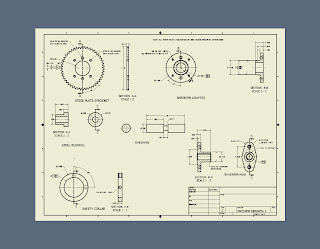Aaron Ordway's Engineering
Tuesday, April 12, 2011
Monday, April 11, 2011
Descriptive Geometry Notes
Manipulating(rotate) picture planes(surfaces) in order to identify:
PDMODE=96
PDsize=.1
TSS
- TSize
- TShape
- TLength
- Tangle
- Intersection
- Distances
- If a line is parrallel to a fold line in one view, it is true length in the next
- First find TL o fline
- Create fold line perpindicular to the TL line
PDMODE=96
PDsize=.1
TSS
- First find TL of one line
- Create a fold line perpindicular to the TL line to get the edge view(EV) of the surface
- Create a foldline parallel to edge view
- Draw a line parrallel to F1 from 1 point to the line you want TL of
- Project the point where it hits the line you want TL of to the next view on the same line
- Connect that point to the point you started with wich gives you a TL line
- create FL perpindicular to TL which will give you your EV including a point
- Create FL parrallel to EV which will give you your TSS surface
Monday, February 28, 2011
Dimension Notes
- ANSI standards
- no arbitrary
- standard way of positioning dimensions, why?
- describe size
- locate details
- For convienence for manufactor
- No calculations necessary
- no duplications
- 1st 3/8 of an in. (9mm) from the object line should be
- lines and symbols inside extension lines if possible
- Extend from object but 1/16 inch (2mm) gap between object and extension line
- Scale=Dim. scale
- runon angle so obvious not part of drawing
- 1/4 inch tail
- arrow if to edge, dot if to surface
- crosss few lines
- any<except horizontal or vertical
- don't pass through corners
- First big 3 H,W,D
- in between viewws if possible
- off view where detail is best described
- do not dim from a hidden line
- locate from common corner
- smallest dim closest to object
- no calc.
- no duplications
- Draw at same angle as object being dim
- use degree symbol %%D
- ARC-anything less then full circle dimas radius
- circle always diam %%C
- Cylinder-in profile (side) view
- hole-where it shows as a hole
Tolerances
- Hold precise tolerances for interchange ability
- how much a dim can vary
- Basic size- exact size
- Tolerance- amount a dim can vary from basic size
- feature-identify geometry
- limits of size- max or min from exact size
- allowance-limits where smallest clearance of largest interference occurs measured at mmc
- limit of a dim where the max material is left on the part
- limit of dim where least amount of maaterial is left on part
- Types of fit
- Clearance-space between parts
- Interference- force fit
- Transition-diff combos, diff fits
Auxiliary Views
- Sometimes you needd more then 3 views
- seconday view used to show true size and shape (TSS)
- perpindicular to recommended surface
- TSS when its edge is parallel to the fold line
- SKIP A VIEW MEASURE BACK
Tuesday, November 30, 2010
Subscribe to:
Comments (Atom)



